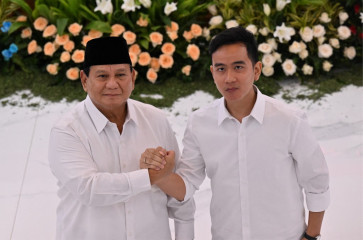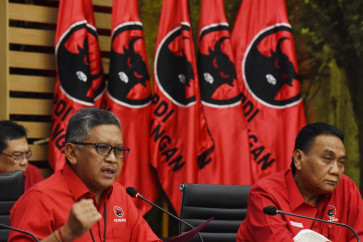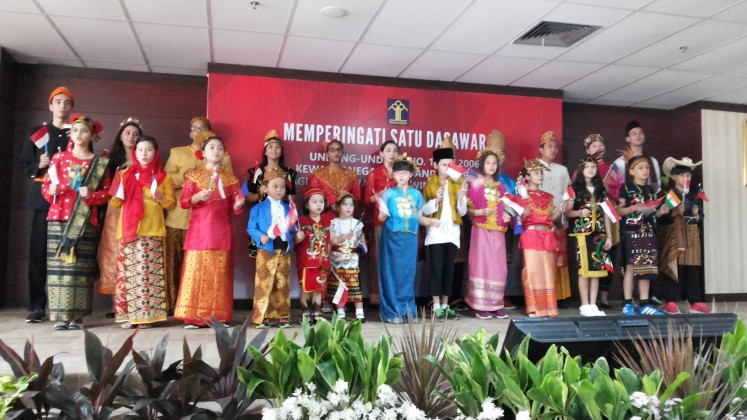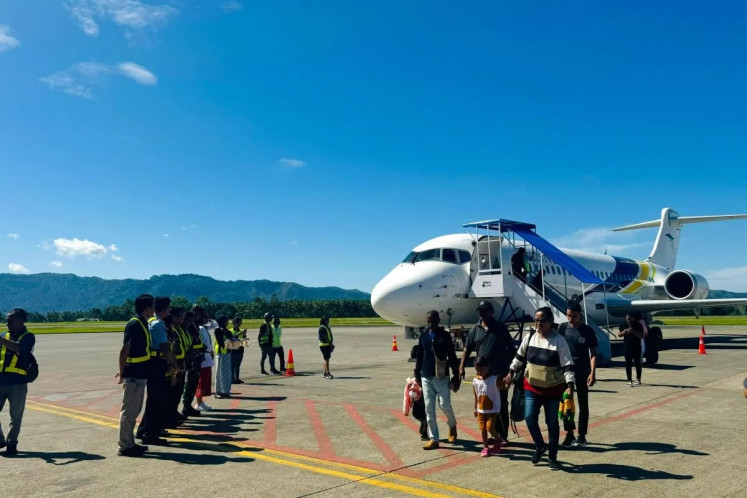Toiling on nuts, bolts, and trust after Tiro's visit
PEACE IN OUR TIME: An elderly resident is among locals greeting Hasan Tiro, the long absent leader of the Free Aceh Movement (GAM), at the town square in Sigli, Pidie regency near his hometown
Change Size

PEACE IN OUR TIME: An elderly resident is among locals greeting Hasan Tiro, the long absent leader of the Free Aceh Movement (GAM), at the town square in Sigli, Pidie regency near his hometown. (JP/Ati Nurbaiti)
The most senior living leader of the former Free Aceh Movement, Hasan Tiro, visited his homeland last month, three years after the signing of the historic agreement on Aug. 15, 2005, between the government and the movement (GAM) in Finland, Helsinki. The following is a report by The Jakarta Post's Ati Nurbaiti, who covered the visit in Banda Aceh and Pidie regency in Nanggroe Aceh Darussalam.
The man who helped draft the initially controversial Aceh peace deal is now doing his part to make sure it works -- ranging from taking out the trash, to signing a pile of receipts after work hours.
M. Nur Djuli, the tall man now in charge of the Aceh Reintegration Agency, the BRA, works from a perch above a flight of stairs. The office has just moved, and the former GAM negotiator now says he must also cover the basics, including ensuring a clean workplace, by taking the trash to its proper place himself, to give a visible example.
Nur Djuli was among the participants in the five rounds of talks resulting in the Memorandum of Understanding signed between the Indonesian government and GAM. After every round they would report to their leader in self exile Hasan Tiro, who visited Aceh last month from Sweden, his adopted country.
Regardless of speculation over Tiro's actual role in the movement, the welcome at every stop was on par to that of a long lost king. But after making long trips to get a glimpse of the "Wali Nanggroe" (guardian of the Aceh state), who was reported to have died a number of times, the masses were satisfied and everyone went back to work feeling more upbeat.
Yet those in charge of the nuts and bolts like Nur Djuli, the second head of the BRA, will remain among the main targets of criticism three years after the MoU was signed.
The BRA carries the crucial mandate of the MoU, namely "reintegration into society" of the sweeping categories of "former combatants, pardoned political prisoners and affected civilians."
As the term of the post tsunami body, the BRR, has ended, its work to be transferred fully into the hands of government by next year, it is the Reintegration Agency which will increasingly bear the brunt of the remaining pains of the conflict.
The challenge to heal those pains may be as daunting, if not more, than the carving out of the peace agreement. The MoU attempted to cover what it could and failing sufficient follow up, leaves society squabbling over unresolved issues.
Nur Djuli says the office itself is bogged down in technicalities.
"We should be monitoring the delivery of funds (compensation to conflict victims) and educating people on the MOU," he said.
But BRA, he said, only received two thirds of last year's budget in September this year from Jakarta. This year it has been allotted funds of Rp 450 billion and everyone's asking where the money is.
While flustered-looking Agency staff describe how they must strategize to spend so much with strict accountability in such a short time, critics say the office has "no clear criteria" to measure any degree of success.
Such sensitive issues will color Aceh's near future -- but at least the province is still under the eyes of the world, as represented on the ground by the Commission for Sustaining Peace in Aceh, with representatives from the parties which supported Aceh's journey to peace, including the European Union and the Association of Southeast Asian Nations.
A representative from another international organization watching Aceh, Juha Christensen, who is from the non government institution which facilitated the MoU in Helsinki, expressed optimism so far on Aceh's peace process.
Despite flaws such as the slow progress in disbursing compensation to victims of conflict and some incidental reports of robbery or violence, he said while accompanying Tiro in one of his family reunions, "we have great confidence ... all parties are so committed to maintaining the peace."
"The value of peace is much higher than such shortcomings", he said, adding that a transition in conflict areas like Aceh might take from five to 20 years.









